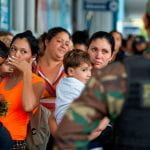
On Wednesday March 1st, our group virtually met with Assistant Chief Immigration Judge Ana Little. She is currently the ACIJ and was promoted in early 2021 by President Joe Biden. Her experience includes being an immigration judge in San Francisco and having a solo pratice in Highlands, New Jersey. Our group talked with Judge Little to hear about the specific variety of the cases she sees everyday.
Judge Little told us the most common cases she sees day to day, which include cases of unacompanied minors crossing the border. She notes that these minors could adjust their status of citezenship in court. In these circumstances Judge Little hopes for the possibility of a “peer review” which is also done in court. She also talks about what could ruin a person’s possibility for citezenship. This include criminal charges that can be as small as a speeding ticket. I enjoyed this interview because it gave our group a deeper look on the process of legal immigration cases. This interview was very much informative.










